Ethical Considerations in End-of-Life Healthcare Decisions
VerifiedAdded on 2023/03/23
|13
|3652
|67
Report
AI Summary
This report delves into the complex ethical issues surrounding end-of-life care, examining the critical principles of autonomy, beneficence, nonmaleficence, justice, and fidelity. It explores challenges such as autonomous decision-making, advance directives, care rationing, and medical futility. The report analyzes the application of ethical theories like Utilitarianism and Kantian ethics to these issues, emphasizing the importance of respecting patient rights and making informed decisions. It highlights the need for healthcare providers to navigate ethical dilemmas while adhering to professional codes of conduct and considering the impact of decisions on patients and their families. The report underscores the significance of advance care planning, patient education, and fair resource allocation in promoting ethical practices and equitable healthcare access. It emphasizes the importance of healthcare providers understanding ethical principles so as to react accordingly to challenges they face.
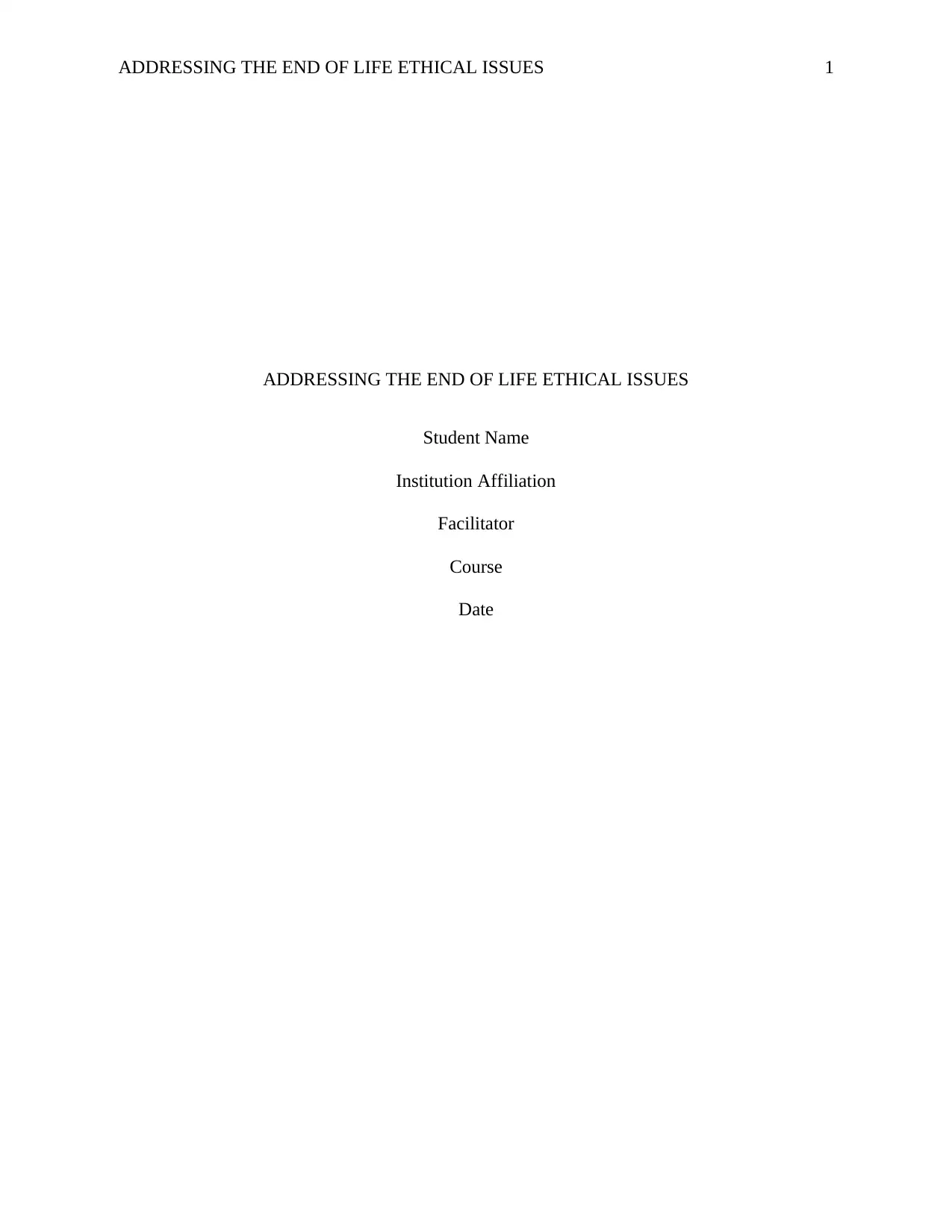
ADDRESSING THE END OF LIFE ETHICAL ISSUES 1
ADDRESSING THE END OF LIFE ETHICAL ISSUES
Student Name
Institution Affiliation
Facilitator
Course
Date
ADDRESSING THE END OF LIFE ETHICAL ISSUES
Student Name
Institution Affiliation
Facilitator
Course
Date
Paraphrase This Document
Need a fresh take? Get an instant paraphrase of this document with our AI Paraphraser
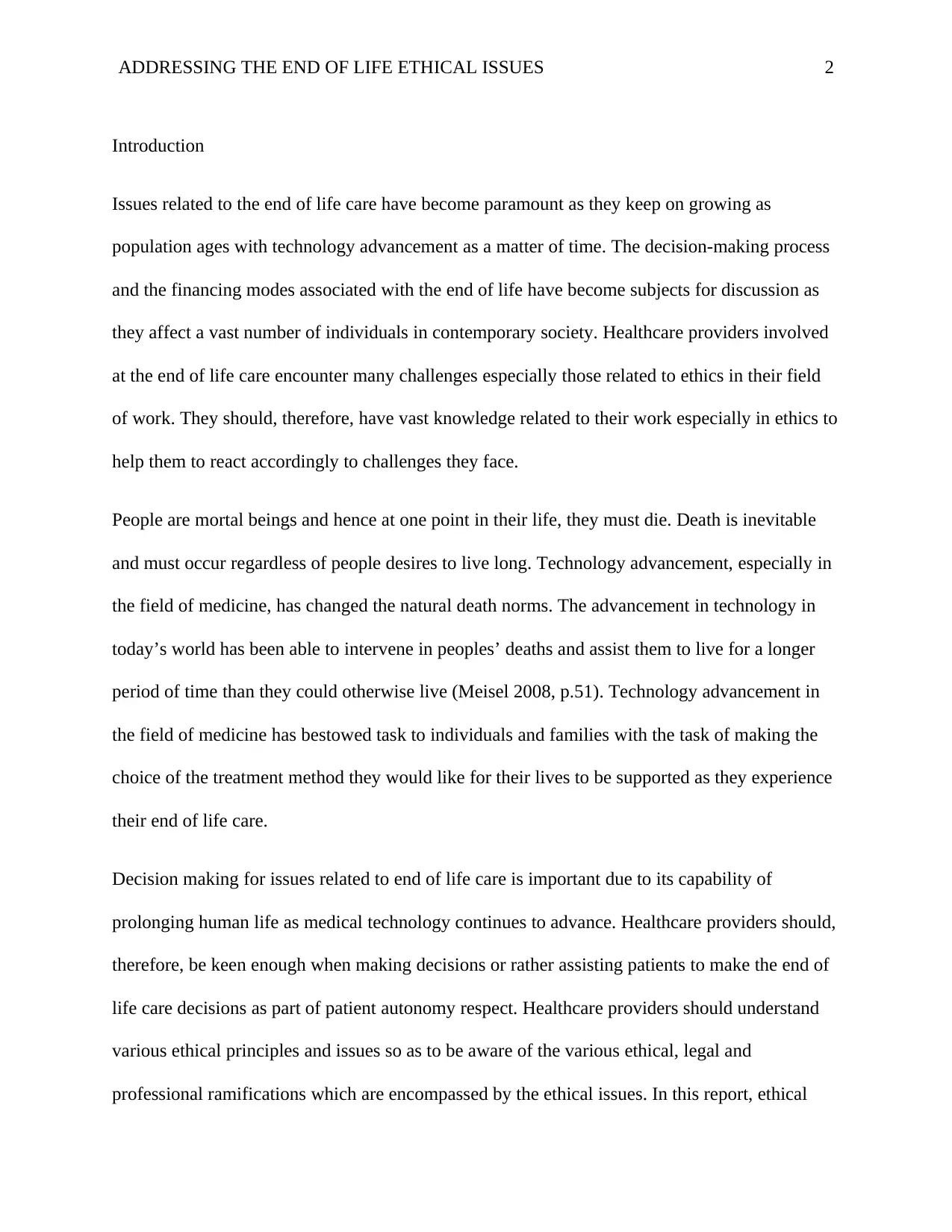
ADDRESSING THE END OF LIFE ETHICAL ISSUES 2
Introduction
Issues related to the end of life care have become paramount as they keep on growing as
population ages with technology advancement as a matter of time. The decision-making process
and the financing modes associated with the end of life have become subjects for discussion as
they affect a vast number of individuals in contemporary society. Healthcare providers involved
at the end of life care encounter many challenges especially those related to ethics in their field
of work. They should, therefore, have vast knowledge related to their work especially in ethics to
help them to react accordingly to challenges they face.
People are mortal beings and hence at one point in their life, they must die. Death is inevitable
and must occur regardless of people desires to live long. Technology advancement, especially in
the field of medicine, has changed the natural death norms. The advancement in technology in
today’s world has been able to intervene in peoples’ deaths and assist them to live for a longer
period of time than they could otherwise live (Meisel 2008, p.51). Technology advancement in
the field of medicine has bestowed task to individuals and families with the task of making the
choice of the treatment method they would like for their lives to be supported as they experience
their end of life care.
Decision making for issues related to end of life care is important due to its capability of
prolonging human life as medical technology continues to advance. Healthcare providers should,
therefore, be keen enough when making decisions or rather assisting patients to make the end of
life care decisions as part of patient autonomy respect. Healthcare providers should understand
various ethical principles and issues so as to be aware of the various ethical, legal and
professional ramifications which are encompassed by the ethical issues. In this report, ethical
Introduction
Issues related to the end of life care have become paramount as they keep on growing as
population ages with technology advancement as a matter of time. The decision-making process
and the financing modes associated with the end of life have become subjects for discussion as
they affect a vast number of individuals in contemporary society. Healthcare providers involved
at the end of life care encounter many challenges especially those related to ethics in their field
of work. They should, therefore, have vast knowledge related to their work especially in ethics to
help them to react accordingly to challenges they face.
People are mortal beings and hence at one point in their life, they must die. Death is inevitable
and must occur regardless of people desires to live long. Technology advancement, especially in
the field of medicine, has changed the natural death norms. The advancement in technology in
today’s world has been able to intervene in peoples’ deaths and assist them to live for a longer
period of time than they could otherwise live (Meisel 2008, p.51). Technology advancement in
the field of medicine has bestowed task to individuals and families with the task of making the
choice of the treatment method they would like for their lives to be supported as they experience
their end of life care.
Decision making for issues related to end of life care is important due to its capability of
prolonging human life as medical technology continues to advance. Healthcare providers should,
therefore, be keen enough when making decisions or rather assisting patients to make the end of
life care decisions as part of patient autonomy respect. Healthcare providers should understand
various ethical principles and issues so as to be aware of the various ethical, legal and
professional ramifications which are encompassed by the ethical issues. In this report, ethical
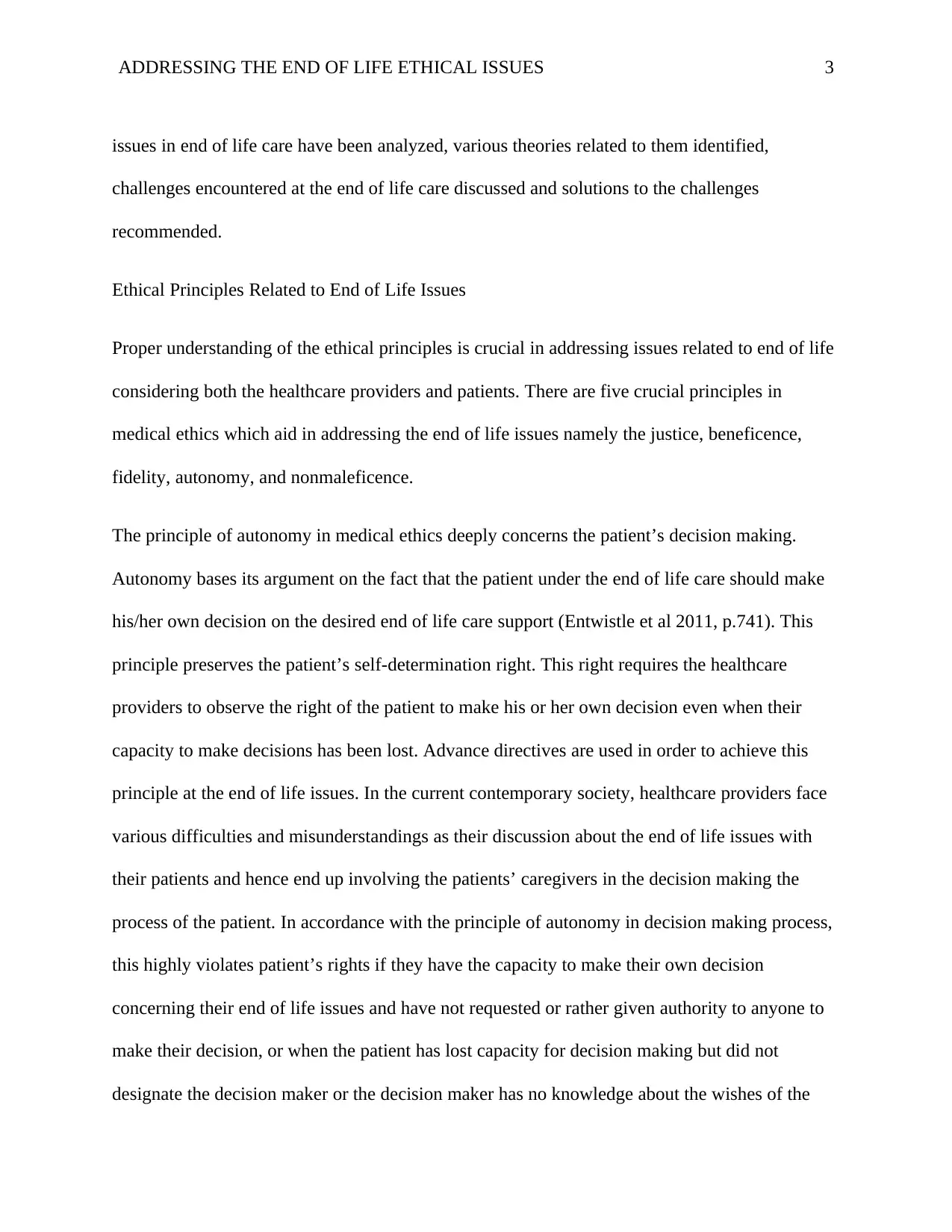
ADDRESSING THE END OF LIFE ETHICAL ISSUES 3
issues in end of life care have been analyzed, various theories related to them identified,
challenges encountered at the end of life care discussed and solutions to the challenges
recommended.
Ethical Principles Related to End of Life Issues
Proper understanding of the ethical principles is crucial in addressing issues related to end of life
considering both the healthcare providers and patients. There are five crucial principles in
medical ethics which aid in addressing the end of life issues namely the justice, beneficence,
fidelity, autonomy, and nonmaleficence.
The principle of autonomy in medical ethics deeply concerns the patient’s decision making.
Autonomy bases its argument on the fact that the patient under the end of life care should make
his/her own decision on the desired end of life care support (Entwistle et al 2011, p.741). This
principle preserves the patient’s self-determination right. This right requires the healthcare
providers to observe the right of the patient to make his or her own decision even when their
capacity to make decisions has been lost. Advance directives are used in order to achieve this
principle at the end of life issues. In the current contemporary society, healthcare providers face
various difficulties and misunderstandings as their discussion about the end of life issues with
their patients and hence end up involving the patients’ caregivers in the decision making the
process of the patient. In accordance with the principle of autonomy in decision making process,
this highly violates patient’s rights if they have the capacity to make their own decision
concerning their end of life issues and have not requested or rather given authority to anyone to
make their decision, or when the patient has lost capacity for decision making but did not
designate the decision maker or the decision maker has no knowledge about the wishes of the
issues in end of life care have been analyzed, various theories related to them identified,
challenges encountered at the end of life care discussed and solutions to the challenges
recommended.
Ethical Principles Related to End of Life Issues
Proper understanding of the ethical principles is crucial in addressing issues related to end of life
considering both the healthcare providers and patients. There are five crucial principles in
medical ethics which aid in addressing the end of life issues namely the justice, beneficence,
fidelity, autonomy, and nonmaleficence.
The principle of autonomy in medical ethics deeply concerns the patient’s decision making.
Autonomy bases its argument on the fact that the patient under the end of life care should make
his/her own decision on the desired end of life care support (Entwistle et al 2011, p.741). This
principle preserves the patient’s self-determination right. This right requires the healthcare
providers to observe the right of the patient to make his or her own decision even when their
capacity to make decisions has been lost. Advance directives are used in order to achieve this
principle at the end of life issues. In the current contemporary society, healthcare providers face
various difficulties and misunderstandings as their discussion about the end of life issues with
their patients and hence end up involving the patients’ caregivers in the decision making the
process of the patient. In accordance with the principle of autonomy in decision making process,
this highly violates patient’s rights if they have the capacity to make their own decision
concerning their end of life issues and have not requested or rather given authority to anyone to
make their decision, or when the patient has lost capacity for decision making but did not
designate the decision maker or the decision maker has no knowledge about the wishes of the
⊘ This is a preview!⊘
Do you want full access?
Subscribe today to unlock all pages.

Trusted by 1+ million students worldwide
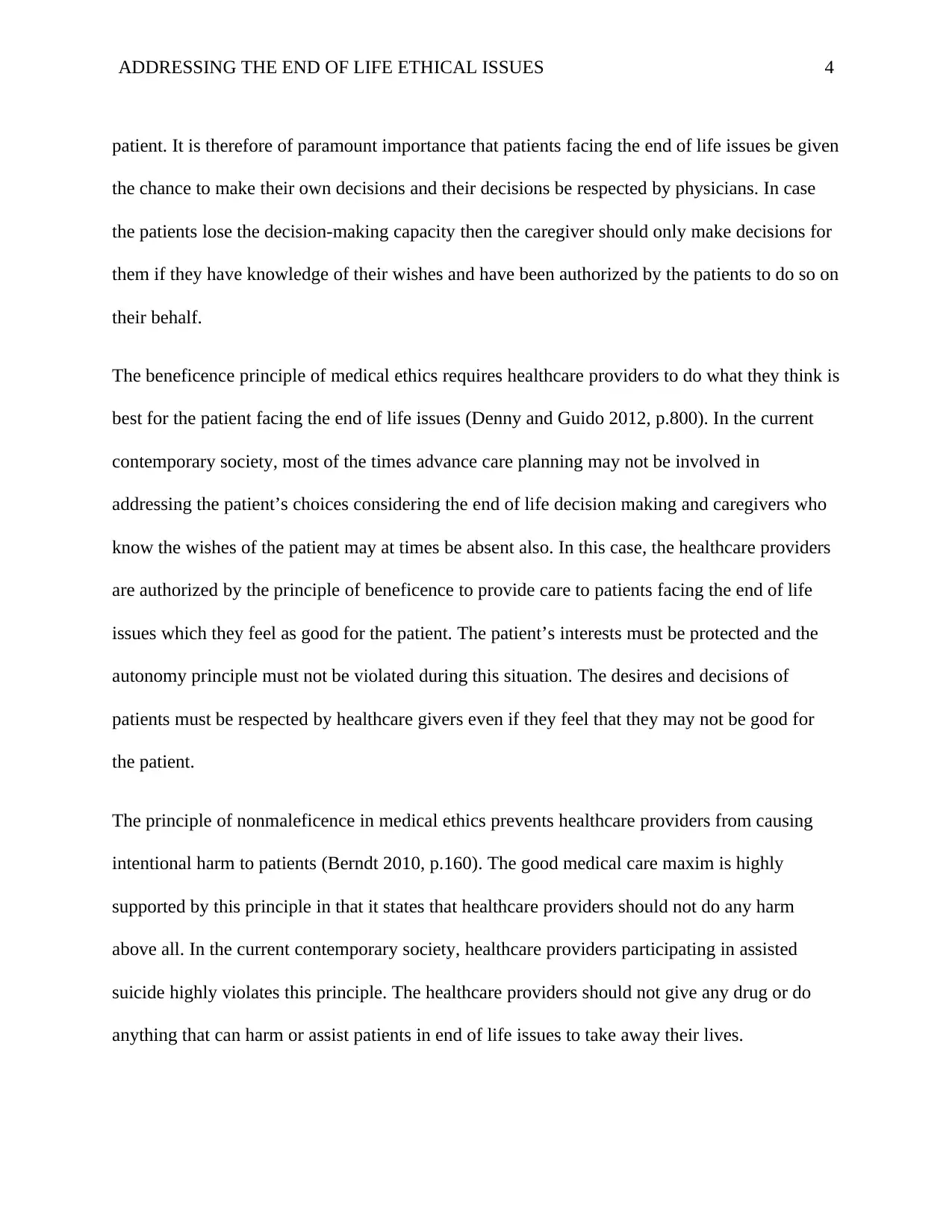
ADDRESSING THE END OF LIFE ETHICAL ISSUES 4
patient. It is therefore of paramount importance that patients facing the end of life issues be given
the chance to make their own decisions and their decisions be respected by physicians. In case
the patients lose the decision-making capacity then the caregiver should only make decisions for
them if they have knowledge of their wishes and have been authorized by the patients to do so on
their behalf.
The beneficence principle of medical ethics requires healthcare providers to do what they think is
best for the patient facing the end of life issues (Denny and Guido 2012, p.800). In the current
contemporary society, most of the times advance care planning may not be involved in
addressing the patient’s choices considering the end of life decision making and caregivers who
know the wishes of the patient may at times be absent also. In this case, the healthcare providers
are authorized by the principle of beneficence to provide care to patients facing the end of life
issues which they feel as good for the patient. The patient’s interests must be protected and the
autonomy principle must not be violated during this situation. The desires and decisions of
patients must be respected by healthcare givers even if they feel that they may not be good for
the patient.
The principle of nonmaleficence in medical ethics prevents healthcare providers from causing
intentional harm to patients (Berndt 2010, p.160). The good medical care maxim is highly
supported by this principle in that it states that healthcare providers should not do any harm
above all. In the current contemporary society, healthcare providers participating in assisted
suicide highly violates this principle. The healthcare providers should not give any drug or do
anything that can harm or assist patients in end of life issues to take away their lives.
patient. It is therefore of paramount importance that patients facing the end of life issues be given
the chance to make their own decisions and their decisions be respected by physicians. In case
the patients lose the decision-making capacity then the caregiver should only make decisions for
them if they have knowledge of their wishes and have been authorized by the patients to do so on
their behalf.
The beneficence principle of medical ethics requires healthcare providers to do what they think is
best for the patient facing the end of life issues (Denny and Guido 2012, p.800). In the current
contemporary society, most of the times advance care planning may not be involved in
addressing the patient’s choices considering the end of life decision making and caregivers who
know the wishes of the patient may at times be absent also. In this case, the healthcare providers
are authorized by the principle of beneficence to provide care to patients facing the end of life
issues which they feel as good for the patient. The patient’s interests must be protected and the
autonomy principle must not be violated during this situation. The desires and decisions of
patients must be respected by healthcare givers even if they feel that they may not be good for
the patient.
The principle of nonmaleficence in medical ethics prevents healthcare providers from causing
intentional harm to patients (Berndt 2010, p.160). The good medical care maxim is highly
supported by this principle in that it states that healthcare providers should not do any harm
above all. In the current contemporary society, healthcare providers participating in assisted
suicide highly violates this principle. The healthcare providers should not give any drug or do
anything that can harm or assist patients in end of life issues to take away their lives.
Paraphrase This Document
Need a fresh take? Get an instant paraphrase of this document with our AI Paraphraser
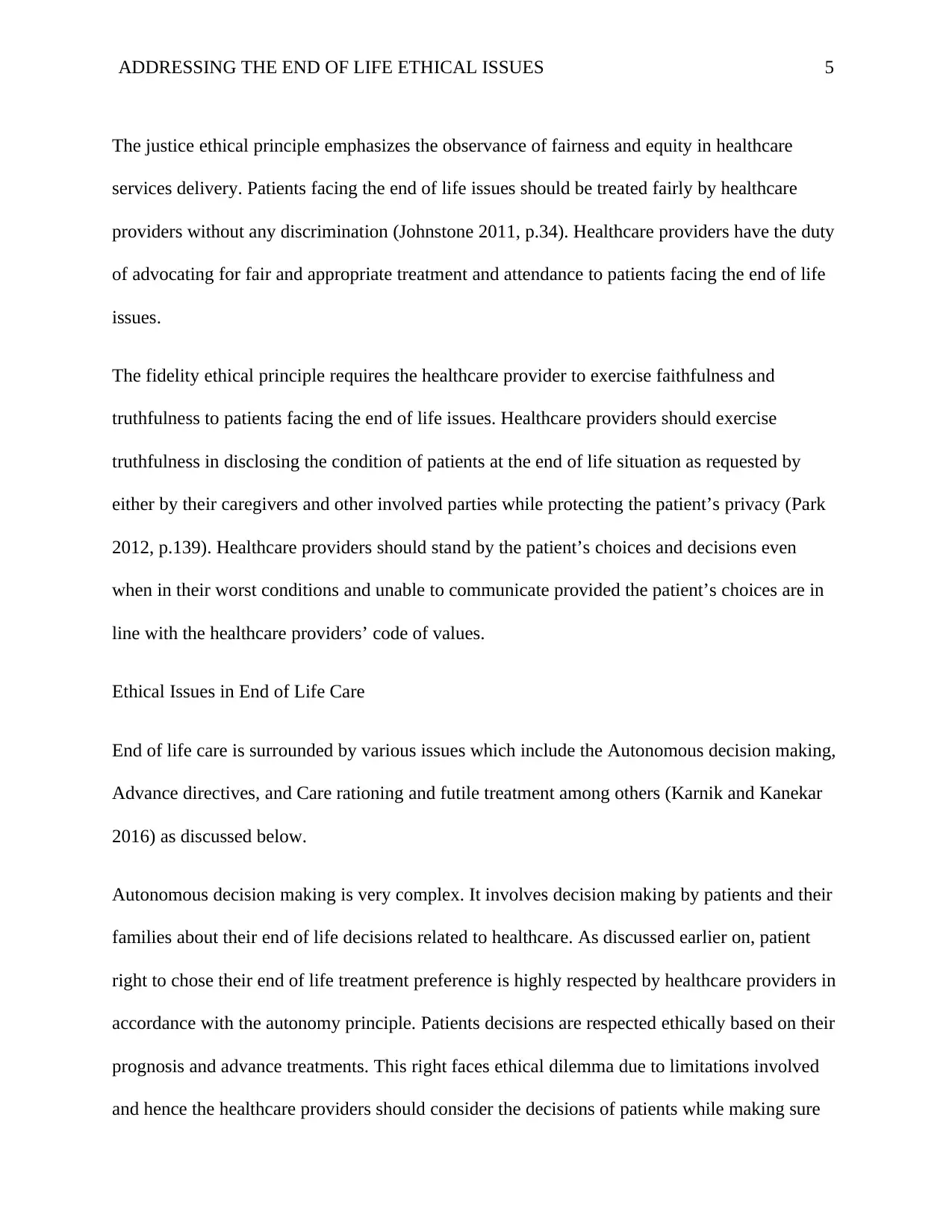
ADDRESSING THE END OF LIFE ETHICAL ISSUES 5
The justice ethical principle emphasizes the observance of fairness and equity in healthcare
services delivery. Patients facing the end of life issues should be treated fairly by healthcare
providers without any discrimination (Johnstone 2011, p.34). Healthcare providers have the duty
of advocating for fair and appropriate treatment and attendance to patients facing the end of life
issues.
The fidelity ethical principle requires the healthcare provider to exercise faithfulness and
truthfulness to patients facing the end of life issues. Healthcare providers should exercise
truthfulness in disclosing the condition of patients at the end of life situation as requested by
either by their caregivers and other involved parties while protecting the patient’s privacy (Park
2012, p.139). Healthcare providers should stand by the patient’s choices and decisions even
when in their worst conditions and unable to communicate provided the patient’s choices are in
line with the healthcare providers’ code of values.
Ethical Issues in End of Life Care
End of life care is surrounded by various issues which include the Autonomous decision making,
Advance directives, and Care rationing and futile treatment among others (Karnik and Kanekar
2016) as discussed below.
Autonomous decision making is very complex. It involves decision making by patients and their
families about their end of life decisions related to healthcare. As discussed earlier on, patient
right to chose their end of life treatment preference is highly respected by healthcare providers in
accordance with the autonomy principle. Patients decisions are respected ethically based on their
prognosis and advance treatments. This right faces ethical dilemma due to limitations involved
and hence the healthcare providers should consider the decisions of patients while making sure
The justice ethical principle emphasizes the observance of fairness and equity in healthcare
services delivery. Patients facing the end of life issues should be treated fairly by healthcare
providers without any discrimination (Johnstone 2011, p.34). Healthcare providers have the duty
of advocating for fair and appropriate treatment and attendance to patients facing the end of life
issues.
The fidelity ethical principle requires the healthcare provider to exercise faithfulness and
truthfulness to patients facing the end of life issues. Healthcare providers should exercise
truthfulness in disclosing the condition of patients at the end of life situation as requested by
either by their caregivers and other involved parties while protecting the patient’s privacy (Park
2012, p.139). Healthcare providers should stand by the patient’s choices and decisions even
when in their worst conditions and unable to communicate provided the patient’s choices are in
line with the healthcare providers’ code of values.
Ethical Issues in End of Life Care
End of life care is surrounded by various issues which include the Autonomous decision making,
Advance directives, and Care rationing and futile treatment among others (Karnik and Kanekar
2016) as discussed below.
Autonomous decision making is very complex. It involves decision making by patients and their
families about their end of life decisions related to healthcare. As discussed earlier on, patient
right to chose their end of life treatment preference is highly respected by healthcare providers in
accordance with the autonomy principle. Patients decisions are respected ethically based on their
prognosis and advance treatments. This right faces ethical dilemma due to limitations involved
and hence the healthcare providers should consider the decisions of patients while making sure
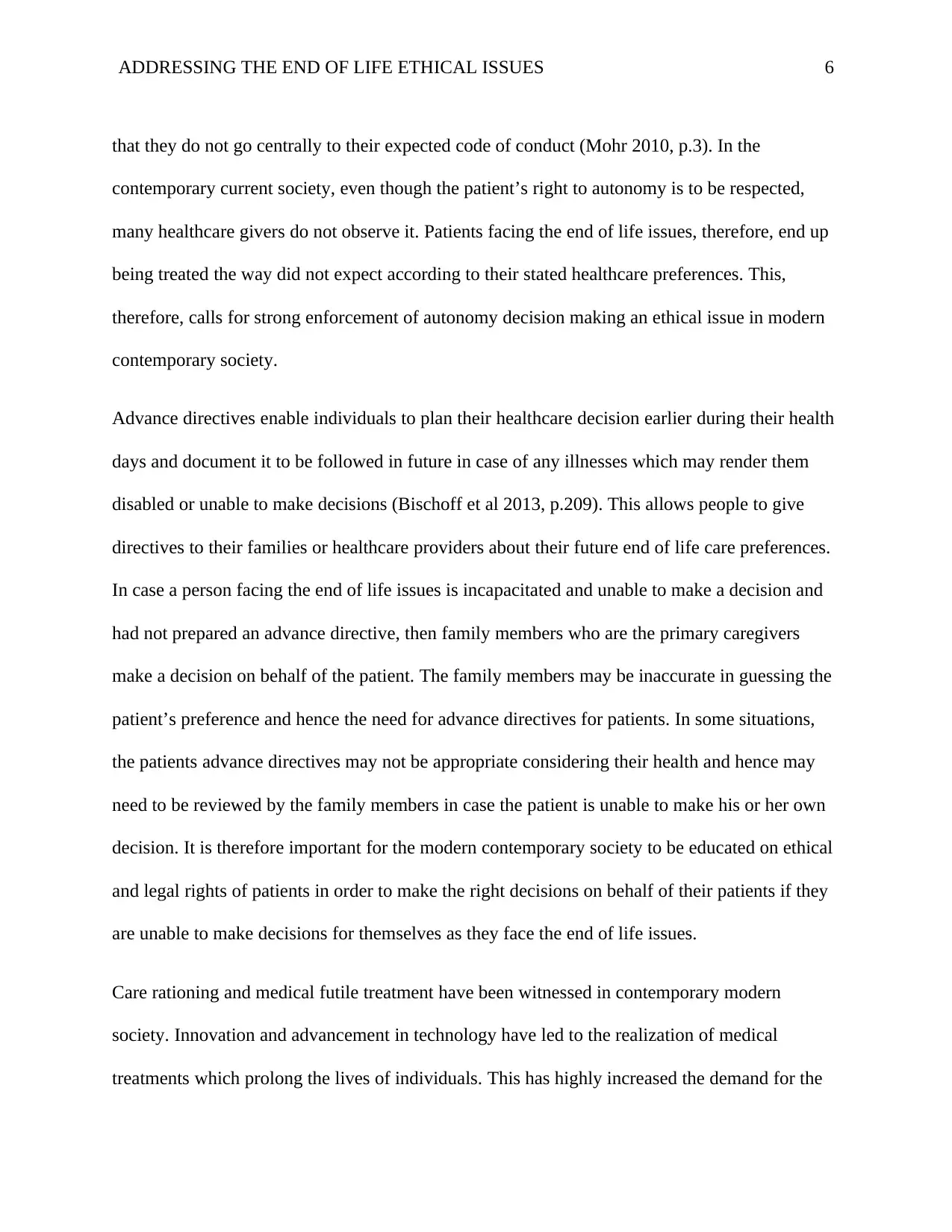
ADDRESSING THE END OF LIFE ETHICAL ISSUES 6
that they do not go centrally to their expected code of conduct (Mohr 2010, p.3). In the
contemporary current society, even though the patient’s right to autonomy is to be respected,
many healthcare givers do not observe it. Patients facing the end of life issues, therefore, end up
being treated the way did not expect according to their stated healthcare preferences. This,
therefore, calls for strong enforcement of autonomy decision making an ethical issue in modern
contemporary society.
Advance directives enable individuals to plan their healthcare decision earlier during their health
days and document it to be followed in future in case of any illnesses which may render them
disabled or unable to make decisions (Bischoff et al 2013, p.209). This allows people to give
directives to their families or healthcare providers about their future end of life care preferences.
In case a person facing the end of life issues is incapacitated and unable to make a decision and
had not prepared an advance directive, then family members who are the primary caregivers
make a decision on behalf of the patient. The family members may be inaccurate in guessing the
patient’s preference and hence the need for advance directives for patients. In some situations,
the patients advance directives may not be appropriate considering their health and hence may
need to be reviewed by the family members in case the patient is unable to make his or her own
decision. It is therefore important for the modern contemporary society to be educated on ethical
and legal rights of patients in order to make the right decisions on behalf of their patients if they
are unable to make decisions for themselves as they face the end of life issues.
Care rationing and medical futile treatment have been witnessed in contemporary modern
society. Innovation and advancement in technology have led to the realization of medical
treatments which prolong the lives of individuals. This has highly increased the demand for the
that they do not go centrally to their expected code of conduct (Mohr 2010, p.3). In the
contemporary current society, even though the patient’s right to autonomy is to be respected,
many healthcare givers do not observe it. Patients facing the end of life issues, therefore, end up
being treated the way did not expect according to their stated healthcare preferences. This,
therefore, calls for strong enforcement of autonomy decision making an ethical issue in modern
contemporary society.
Advance directives enable individuals to plan their healthcare decision earlier during their health
days and document it to be followed in future in case of any illnesses which may render them
disabled or unable to make decisions (Bischoff et al 2013, p.209). This allows people to give
directives to their families or healthcare providers about their future end of life care preferences.
In case a person facing the end of life issues is incapacitated and unable to make a decision and
had not prepared an advance directive, then family members who are the primary caregivers
make a decision on behalf of the patient. The family members may be inaccurate in guessing the
patient’s preference and hence the need for advance directives for patients. In some situations,
the patients advance directives may not be appropriate considering their health and hence may
need to be reviewed by the family members in case the patient is unable to make his or her own
decision. It is therefore important for the modern contemporary society to be educated on ethical
and legal rights of patients in order to make the right decisions on behalf of their patients if they
are unable to make decisions for themselves as they face the end of life issues.
Care rationing and medical futile treatment have been witnessed in contemporary modern
society. Innovation and advancement in technology have led to the realization of medical
treatments which prolong the lives of individuals. This has highly increased the demand for the
⊘ This is a preview!⊘
Do you want full access?
Subscribe today to unlock all pages.

Trusted by 1+ million students worldwide
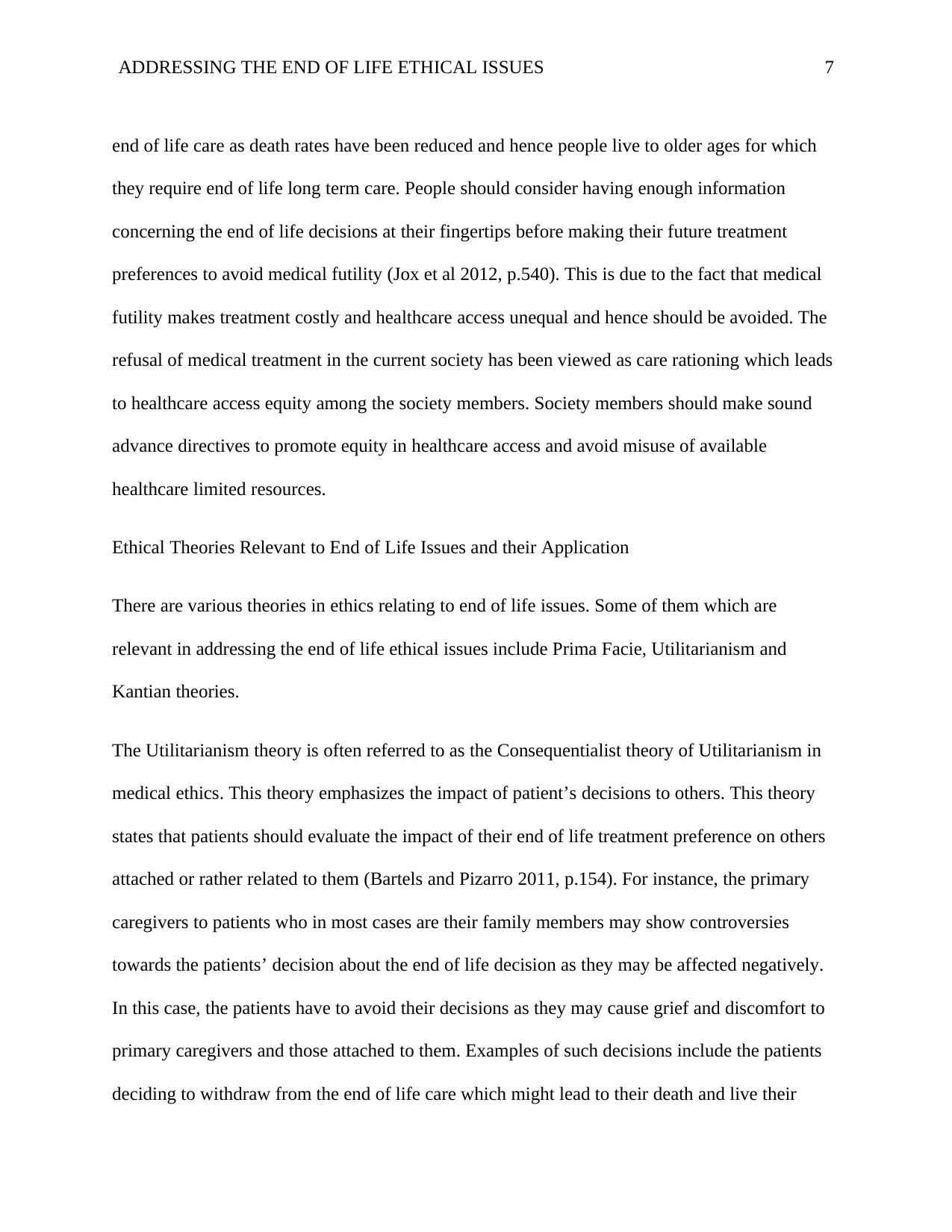
ADDRESSING THE END OF LIFE ETHICAL ISSUES 7
end of life care as death rates have been reduced and hence people live to older ages for which
they require end of life long term care. People should consider having enough information
concerning the end of life decisions at their fingertips before making their future treatment
preferences to avoid medical futility (Jox et al 2012, p.540). This is due to the fact that medical
futility makes treatment costly and healthcare access unequal and hence should be avoided. The
refusal of medical treatment in the current society has been viewed as care rationing which leads
to healthcare access equity among the society members. Society members should make sound
advance directives to promote equity in healthcare access and avoid misuse of available
healthcare limited resources.
Ethical Theories Relevant to End of Life Issues and their Application
There are various theories in ethics relating to end of life issues. Some of them which are
relevant in addressing the end of life ethical issues include Prima Facie, Utilitarianism and
Kantian theories.
The Utilitarianism theory is often referred to as the Consequentialist theory of Utilitarianism in
medical ethics. This theory emphasizes the impact of patient’s decisions to others. This theory
states that patients should evaluate the impact of their end of life treatment preference on others
attached or rather related to them (Bartels and Pizarro 2011, p.154). For instance, the primary
caregivers to patients who in most cases are their family members may show controversies
towards the patients’ decision about the end of life decision as they may be affected negatively.
In this case, the patients have to avoid their decisions as they may cause grief and discomfort to
primary caregivers and those attached to them. Examples of such decisions include the patients
deciding to withdraw from the end of life care which might lead to their death and live their
end of life care as death rates have been reduced and hence people live to older ages for which
they require end of life long term care. People should consider having enough information
concerning the end of life decisions at their fingertips before making their future treatment
preferences to avoid medical futility (Jox et al 2012, p.540). This is due to the fact that medical
futility makes treatment costly and healthcare access unequal and hence should be avoided. The
refusal of medical treatment in the current society has been viewed as care rationing which leads
to healthcare access equity among the society members. Society members should make sound
advance directives to promote equity in healthcare access and avoid misuse of available
healthcare limited resources.
Ethical Theories Relevant to End of Life Issues and their Application
There are various theories in ethics relating to end of life issues. Some of them which are
relevant in addressing the end of life ethical issues include Prima Facie, Utilitarianism and
Kantian theories.
The Utilitarianism theory is often referred to as the Consequentialist theory of Utilitarianism in
medical ethics. This theory emphasizes the impact of patient’s decisions to others. This theory
states that patients should evaluate the impact of their end of life treatment preference on others
attached or rather related to them (Bartels and Pizarro 2011, p.154). For instance, the primary
caregivers to patients who in most cases are their family members may show controversies
towards the patients’ decision about the end of life decision as they may be affected negatively.
In this case, the patients have to avoid their decisions as they may cause grief and discomfort to
primary caregivers and those attached to them. Examples of such decisions include the patients
deciding to withdraw from the end of life care which might lead to their death and live their
Paraphrase This Document
Need a fresh take? Get an instant paraphrase of this document with our AI Paraphraser
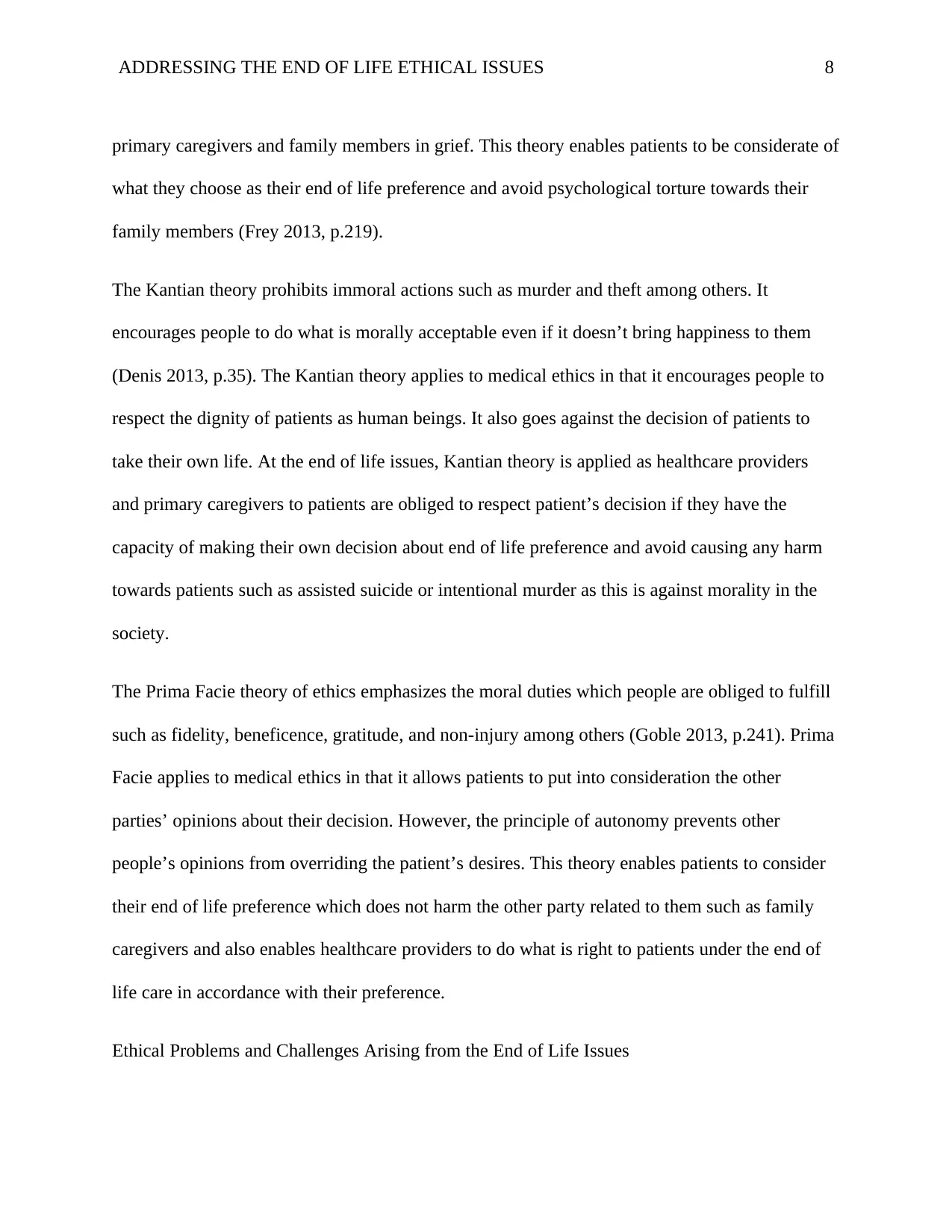
ADDRESSING THE END OF LIFE ETHICAL ISSUES 8
primary caregivers and family members in grief. This theory enables patients to be considerate of
what they choose as their end of life preference and avoid psychological torture towards their
family members (Frey 2013, p.219).
The Kantian theory prohibits immoral actions such as murder and theft among others. It
encourages people to do what is morally acceptable even if it doesn’t bring happiness to them
(Denis 2013, p.35). The Kantian theory applies to medical ethics in that it encourages people to
respect the dignity of patients as human beings. It also goes against the decision of patients to
take their own life. At the end of life issues, Kantian theory is applied as healthcare providers
and primary caregivers to patients are obliged to respect patient’s decision if they have the
capacity of making their own decision about end of life preference and avoid causing any harm
towards patients such as assisted suicide or intentional murder as this is against morality in the
society.
The Prima Facie theory of ethics emphasizes the moral duties which people are obliged to fulfill
such as fidelity, beneficence, gratitude, and non-injury among others (Goble 2013, p.241). Prima
Facie applies to medical ethics in that it allows patients to put into consideration the other
parties’ opinions about their decision. However, the principle of autonomy prevents other
people’s opinions from overriding the patient’s desires. This theory enables patients to consider
their end of life preference which does not harm the other party related to them such as family
caregivers and also enables healthcare providers to do what is right to patients under the end of
life care in accordance with their preference.
Ethical Problems and Challenges Arising from the End of Life Issues
primary caregivers and family members in grief. This theory enables patients to be considerate of
what they choose as their end of life preference and avoid psychological torture towards their
family members (Frey 2013, p.219).
The Kantian theory prohibits immoral actions such as murder and theft among others. It
encourages people to do what is morally acceptable even if it doesn’t bring happiness to them
(Denis 2013, p.35). The Kantian theory applies to medical ethics in that it encourages people to
respect the dignity of patients as human beings. It also goes against the decision of patients to
take their own life. At the end of life issues, Kantian theory is applied as healthcare providers
and primary caregivers to patients are obliged to respect patient’s decision if they have the
capacity of making their own decision about end of life preference and avoid causing any harm
towards patients such as assisted suicide or intentional murder as this is against morality in the
society.
The Prima Facie theory of ethics emphasizes the moral duties which people are obliged to fulfill
such as fidelity, beneficence, gratitude, and non-injury among others (Goble 2013, p.241). Prima
Facie applies to medical ethics in that it allows patients to put into consideration the other
parties’ opinions about their decision. However, the principle of autonomy prevents other
people’s opinions from overriding the patient’s desires. This theory enables patients to consider
their end of life preference which does not harm the other party related to them such as family
caregivers and also enables healthcare providers to do what is right to patients under the end of
life care in accordance with their preference.
Ethical Problems and Challenges Arising from the End of Life Issues
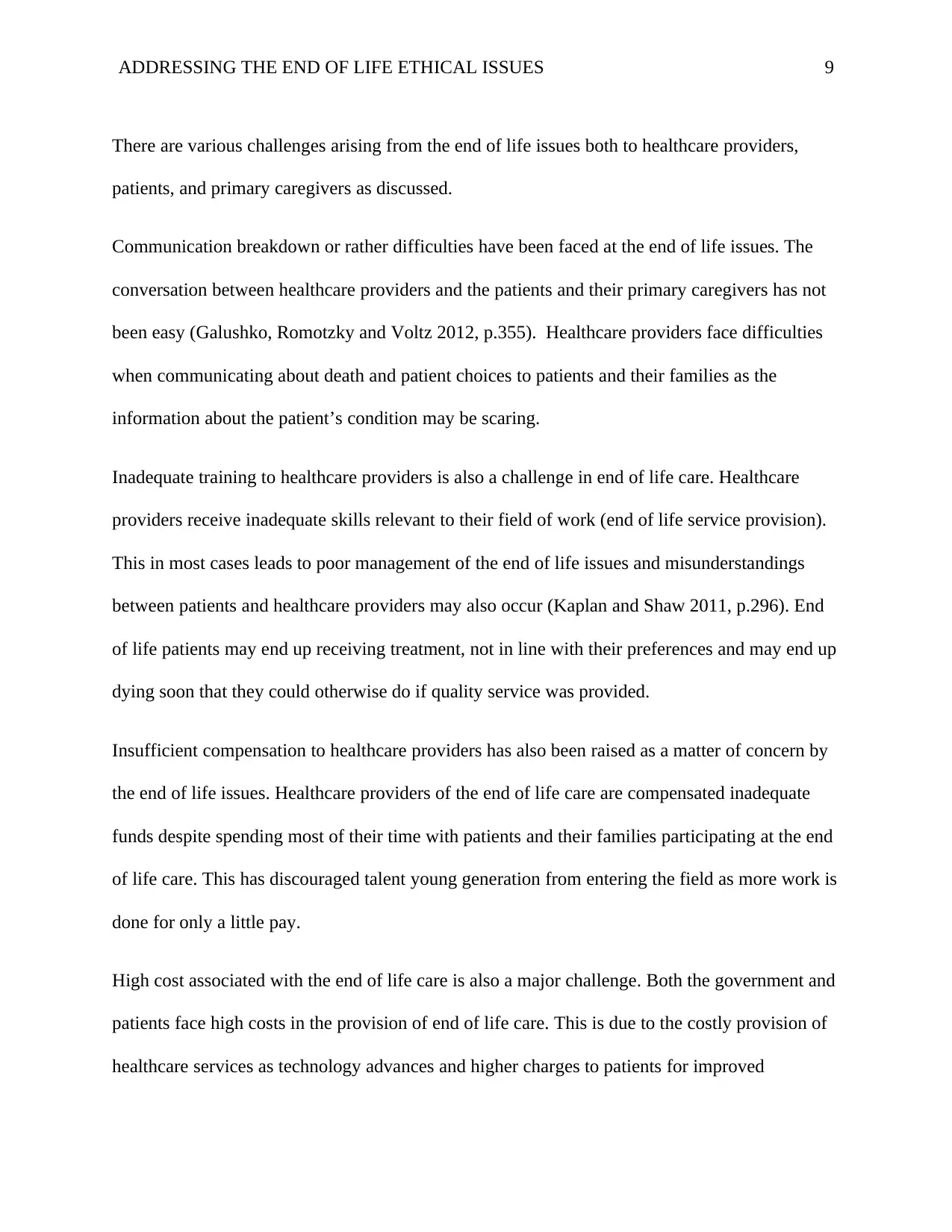
ADDRESSING THE END OF LIFE ETHICAL ISSUES 9
There are various challenges arising from the end of life issues both to healthcare providers,
patients, and primary caregivers as discussed.
Communication breakdown or rather difficulties have been faced at the end of life issues. The
conversation between healthcare providers and the patients and their primary caregivers has not
been easy (Galushko, Romotzky and Voltz 2012, p.355). Healthcare providers face difficulties
when communicating about death and patient choices to patients and their families as the
information about the patient’s condition may be scaring.
Inadequate training to healthcare providers is also a challenge in end of life care. Healthcare
providers receive inadequate skills relevant to their field of work (end of life service provision).
This in most cases leads to poor management of the end of life issues and misunderstandings
between patients and healthcare providers may also occur (Kaplan and Shaw 2011, p.296). End
of life patients may end up receiving treatment, not in line with their preferences and may end up
dying soon that they could otherwise do if quality service was provided.
Insufficient compensation to healthcare providers has also been raised as a matter of concern by
the end of life issues. Healthcare providers of the end of life care are compensated inadequate
funds despite spending most of their time with patients and their families participating at the end
of life care. This has discouraged talent young generation from entering the field as more work is
done for only a little pay.
High cost associated with the end of life care is also a major challenge. Both the government and
patients face high costs in the provision of end of life care. This is due to the costly provision of
healthcare services as technology advances and higher charges to patients for improved
There are various challenges arising from the end of life issues both to healthcare providers,
patients, and primary caregivers as discussed.
Communication breakdown or rather difficulties have been faced at the end of life issues. The
conversation between healthcare providers and the patients and their primary caregivers has not
been easy (Galushko, Romotzky and Voltz 2012, p.355). Healthcare providers face difficulties
when communicating about death and patient choices to patients and their families as the
information about the patient’s condition may be scaring.
Inadequate training to healthcare providers is also a challenge in end of life care. Healthcare
providers receive inadequate skills relevant to their field of work (end of life service provision).
This in most cases leads to poor management of the end of life issues and misunderstandings
between patients and healthcare providers may also occur (Kaplan and Shaw 2011, p.296). End
of life patients may end up receiving treatment, not in line with their preferences and may end up
dying soon that they could otherwise do if quality service was provided.
Insufficient compensation to healthcare providers has also been raised as a matter of concern by
the end of life issues. Healthcare providers of the end of life care are compensated inadequate
funds despite spending most of their time with patients and their families participating at the end
of life care. This has discouraged talent young generation from entering the field as more work is
done for only a little pay.
High cost associated with the end of life care is also a major challenge. Both the government and
patients face high costs in the provision of end of life care. This is due to the costly provision of
healthcare services as technology advances and higher charges to patients for improved
⊘ This is a preview!⊘
Do you want full access?
Subscribe today to unlock all pages.

Trusted by 1+ million students worldwide
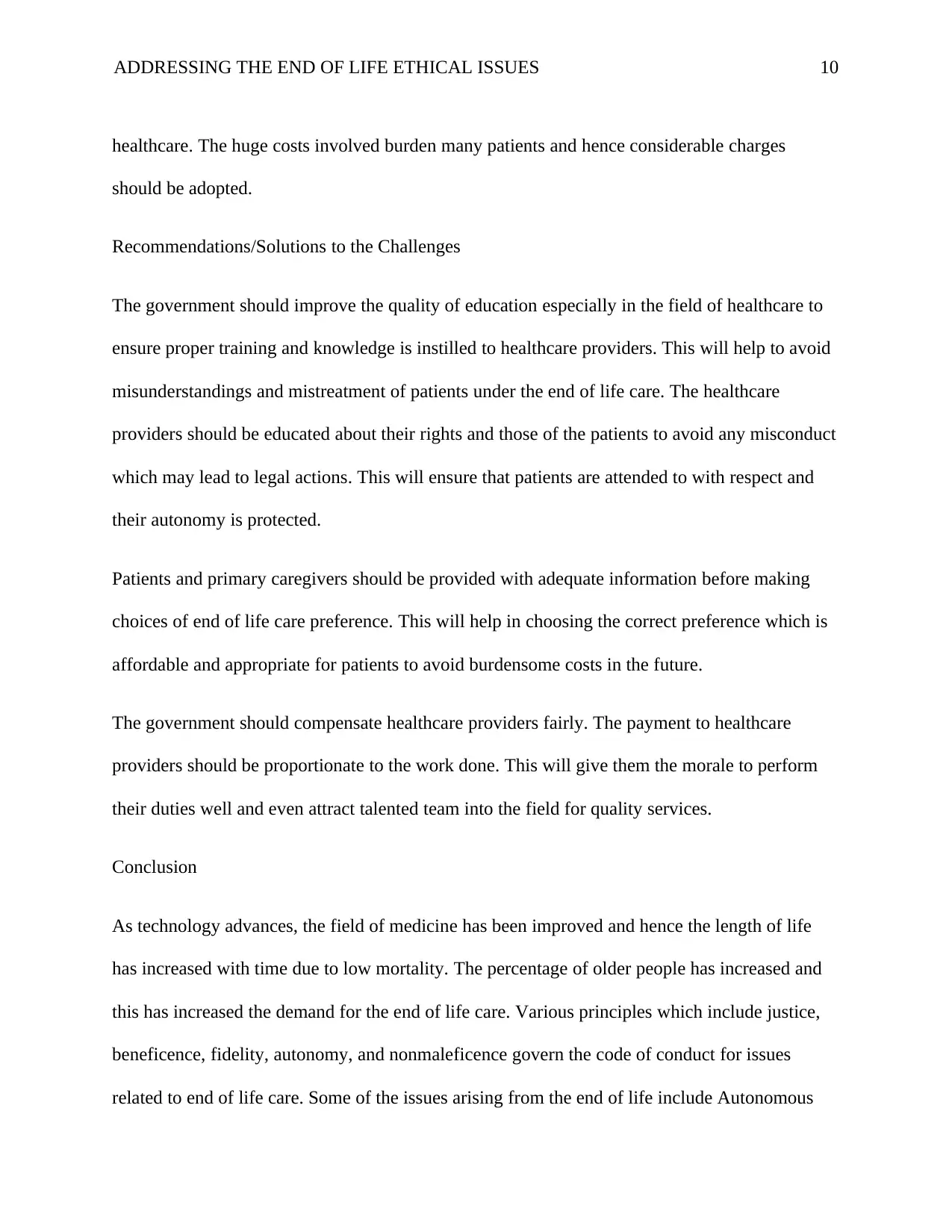
ADDRESSING THE END OF LIFE ETHICAL ISSUES 10
healthcare. The huge costs involved burden many patients and hence considerable charges
should be adopted.
Recommendations/Solutions to the Challenges
The government should improve the quality of education especially in the field of healthcare to
ensure proper training and knowledge is instilled to healthcare providers. This will help to avoid
misunderstandings and mistreatment of patients under the end of life care. The healthcare
providers should be educated about their rights and those of the patients to avoid any misconduct
which may lead to legal actions. This will ensure that patients are attended to with respect and
their autonomy is protected.
Patients and primary caregivers should be provided with adequate information before making
choices of end of life care preference. This will help in choosing the correct preference which is
affordable and appropriate for patients to avoid burdensome costs in the future.
The government should compensate healthcare providers fairly. The payment to healthcare
providers should be proportionate to the work done. This will give them the morale to perform
their duties well and even attract talented team into the field for quality services.
Conclusion
As technology advances, the field of medicine has been improved and hence the length of life
has increased with time due to low mortality. The percentage of older people has increased and
this has increased the demand for the end of life care. Various principles which include justice,
beneficence, fidelity, autonomy, and nonmaleficence govern the code of conduct for issues
related to end of life care. Some of the issues arising from the end of life include Autonomous
healthcare. The huge costs involved burden many patients and hence considerable charges
should be adopted.
Recommendations/Solutions to the Challenges
The government should improve the quality of education especially in the field of healthcare to
ensure proper training and knowledge is instilled to healthcare providers. This will help to avoid
misunderstandings and mistreatment of patients under the end of life care. The healthcare
providers should be educated about their rights and those of the patients to avoid any misconduct
which may lead to legal actions. This will ensure that patients are attended to with respect and
their autonomy is protected.
Patients and primary caregivers should be provided with adequate information before making
choices of end of life care preference. This will help in choosing the correct preference which is
affordable and appropriate for patients to avoid burdensome costs in the future.
The government should compensate healthcare providers fairly. The payment to healthcare
providers should be proportionate to the work done. This will give them the morale to perform
their duties well and even attract talented team into the field for quality services.
Conclusion
As technology advances, the field of medicine has been improved and hence the length of life
has increased with time due to low mortality. The percentage of older people has increased and
this has increased the demand for the end of life care. Various principles which include justice,
beneficence, fidelity, autonomy, and nonmaleficence govern the code of conduct for issues
related to end of life care. Some of the issues arising from the end of life include Autonomous
Paraphrase This Document
Need a fresh take? Get an instant paraphrase of this document with our AI Paraphraser
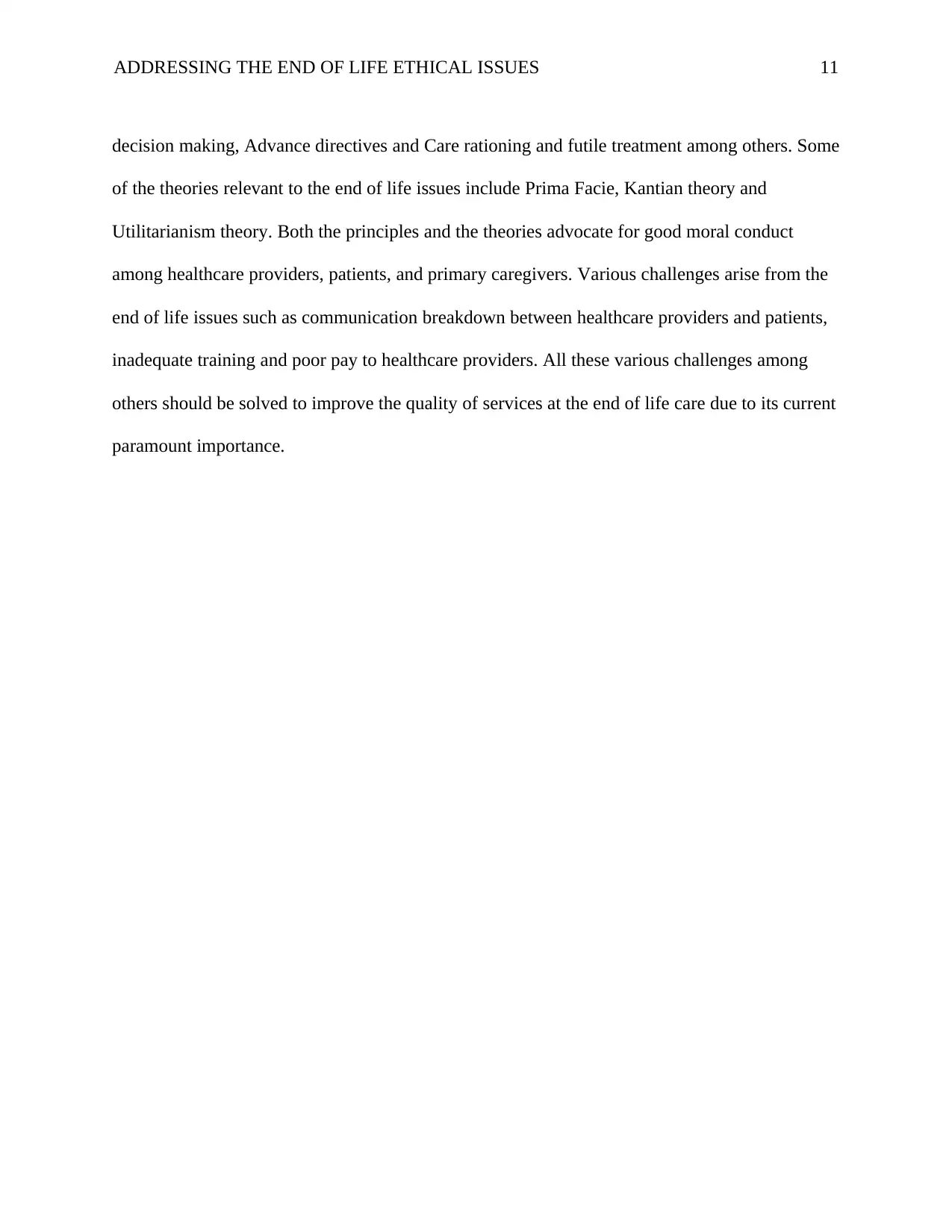
ADDRESSING THE END OF LIFE ETHICAL ISSUES 11
decision making, Advance directives and Care rationing and futile treatment among others. Some
of the theories relevant to the end of life issues include Prima Facie, Kantian theory and
Utilitarianism theory. Both the principles and the theories advocate for good moral conduct
among healthcare providers, patients, and primary caregivers. Various challenges arise from the
end of life issues such as communication breakdown between healthcare providers and patients,
inadequate training and poor pay to healthcare providers. All these various challenges among
others should be solved to improve the quality of services at the end of life care due to its current
paramount importance.
decision making, Advance directives and Care rationing and futile treatment among others. Some
of the theories relevant to the end of life issues include Prima Facie, Kantian theory and
Utilitarianism theory. Both the principles and the theories advocate for good moral conduct
among healthcare providers, patients, and primary caregivers. Various challenges arise from the
end of life issues such as communication breakdown between healthcare providers and patients,
inadequate training and poor pay to healthcare providers. All these various challenges among
others should be solved to improve the quality of services at the end of life care due to its current
paramount importance.
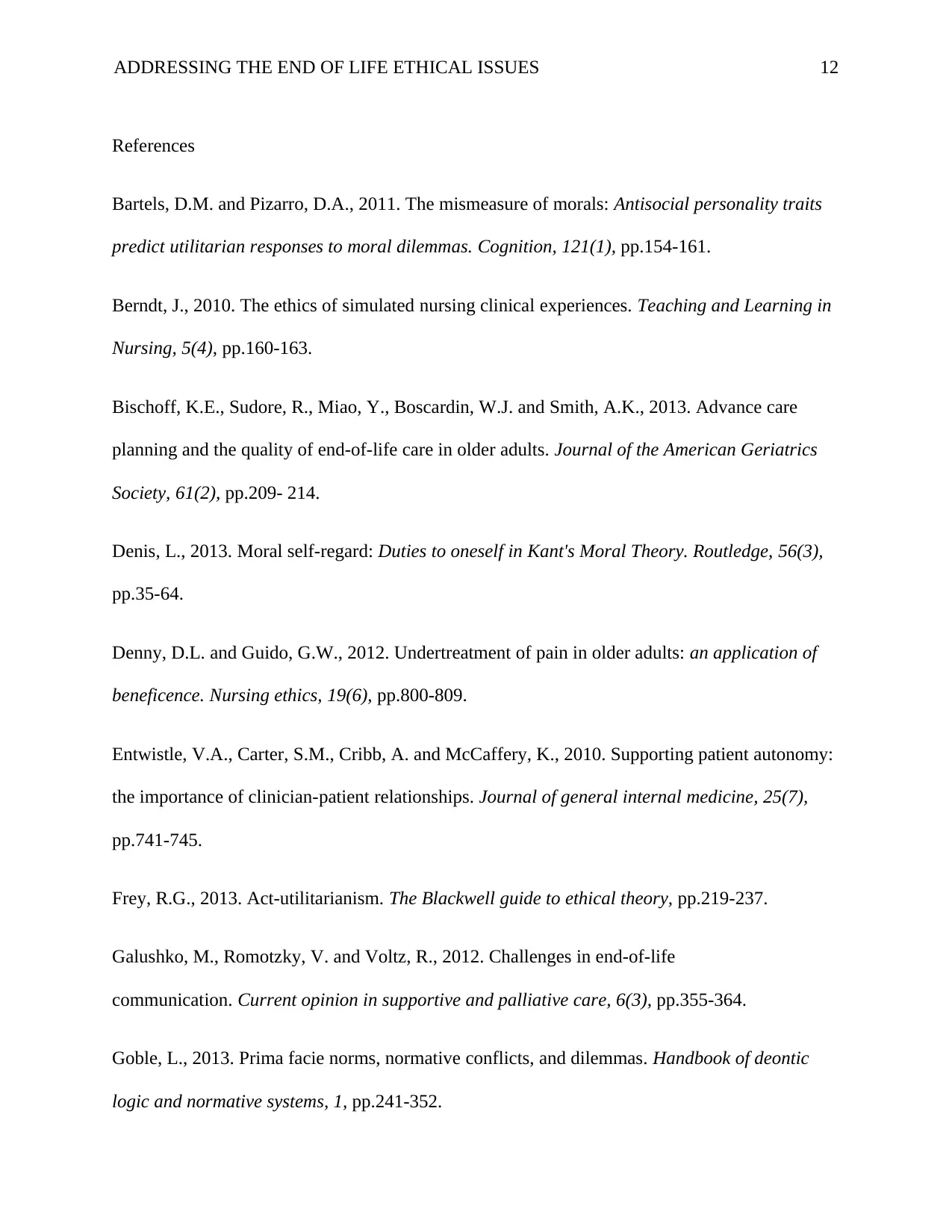
ADDRESSING THE END OF LIFE ETHICAL ISSUES 12
References
Bartels, D.M. and Pizarro, D.A., 2011. The mismeasure of morals: Antisocial personality traits
predict utilitarian responses to moral dilemmas. Cognition, 121(1), pp.154-161.
Berndt, J., 2010. The ethics of simulated nursing clinical experiences. Teaching and Learning in
Nursing, 5(4), pp.160-163.
Bischoff, K.E., Sudore, R., Miao, Y., Boscardin, W.J. and Smith, A.K., 2013. Advance care
planning and the quality of end‐of‐life care in older adults. Journal of the American Geriatrics
Society, 61(2), pp.209- 214.
Denis, L., 2013. Moral self-regard: Duties to oneself in Kant's Moral Theory. Routledge, 56(3),
pp.35-64.
Denny, D.L. and Guido, G.W., 2012. Undertreatment of pain in older adults: an application of
beneficence. Nursing ethics, 19(6), pp.800-809.
Entwistle, V.A., Carter, S.M., Cribb, A. and McCaffery, K., 2010. Supporting patient autonomy:
the importance of clinician-patient relationships. Journal of general internal medicine, 25(7),
pp.741-745.
Frey, R.G., 2013. Act‐utilitarianism. The Blackwell guide to ethical theory, pp.219-237.
Galushko, M., Romotzky, V. and Voltz, R., 2012. Challenges in end-of-life
communication. Current opinion in supportive and palliative care, 6(3), pp.355-364.
Goble, L., 2013. Prima facie norms, normative conflicts, and dilemmas. Handbook of deontic
logic and normative systems, 1, pp.241-352.
References
Bartels, D.M. and Pizarro, D.A., 2011. The mismeasure of morals: Antisocial personality traits
predict utilitarian responses to moral dilemmas. Cognition, 121(1), pp.154-161.
Berndt, J., 2010. The ethics of simulated nursing clinical experiences. Teaching and Learning in
Nursing, 5(4), pp.160-163.
Bischoff, K.E., Sudore, R., Miao, Y., Boscardin, W.J. and Smith, A.K., 2013. Advance care
planning and the quality of end‐of‐life care in older adults. Journal of the American Geriatrics
Society, 61(2), pp.209- 214.
Denis, L., 2013. Moral self-regard: Duties to oneself in Kant's Moral Theory. Routledge, 56(3),
pp.35-64.
Denny, D.L. and Guido, G.W., 2012. Undertreatment of pain in older adults: an application of
beneficence. Nursing ethics, 19(6), pp.800-809.
Entwistle, V.A., Carter, S.M., Cribb, A. and McCaffery, K., 2010. Supporting patient autonomy:
the importance of clinician-patient relationships. Journal of general internal medicine, 25(7),
pp.741-745.
Frey, R.G., 2013. Act‐utilitarianism. The Blackwell guide to ethical theory, pp.219-237.
Galushko, M., Romotzky, V. and Voltz, R., 2012. Challenges in end-of-life
communication. Current opinion in supportive and palliative care, 6(3), pp.355-364.
Goble, L., 2013. Prima facie norms, normative conflicts, and dilemmas. Handbook of deontic
logic and normative systems, 1, pp.241-352.
⊘ This is a preview!⊘
Do you want full access?
Subscribe today to unlock all pages.

Trusted by 1+ million students worldwide
1 out of 13
Related Documents
Your All-in-One AI-Powered Toolkit for Academic Success.
+13062052269
info@desklib.com
Available 24*7 on WhatsApp / Email
![[object Object]](/_next/static/media/star-bottom.7253800d.svg)
Unlock your academic potential
Copyright © 2020–2026 A2Z Services. All Rights Reserved. Developed and managed by ZUCOL.





